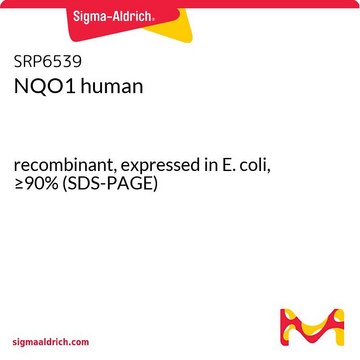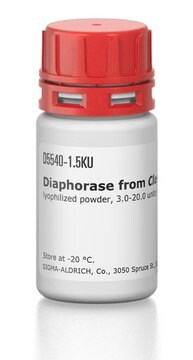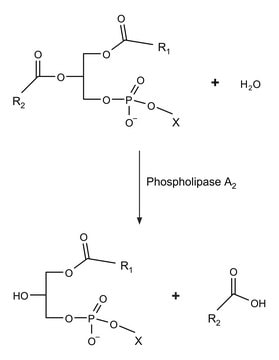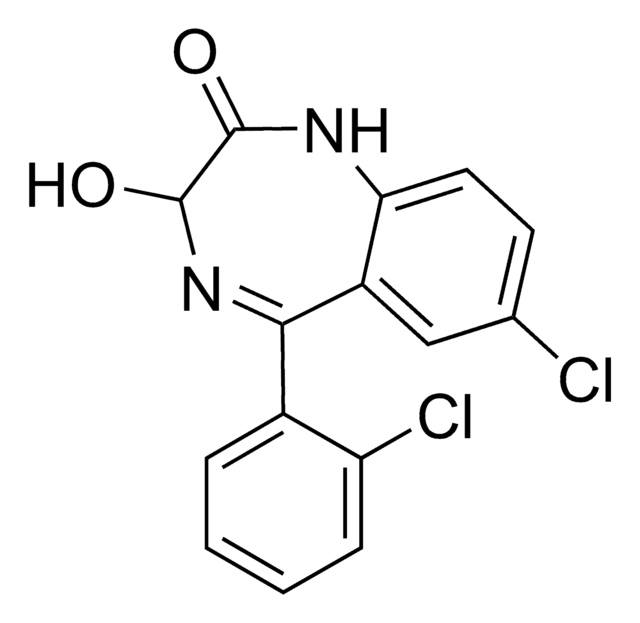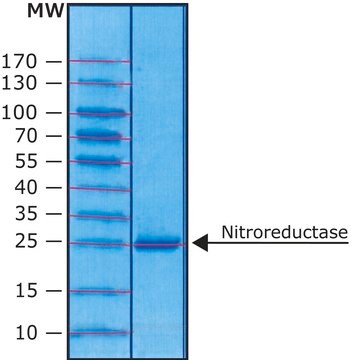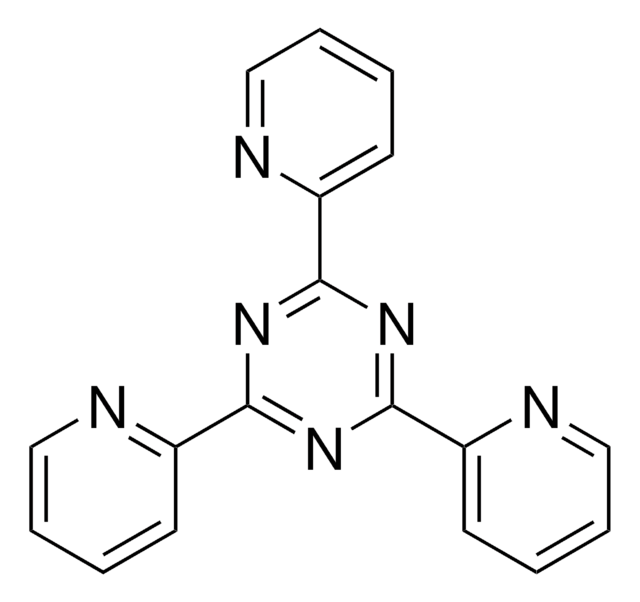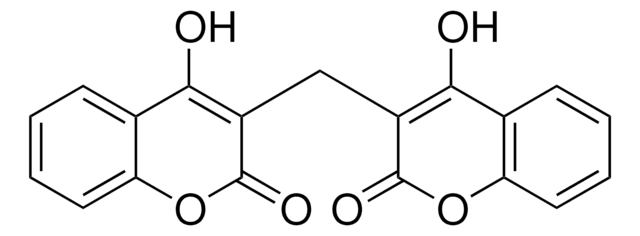D1315
DT Diaphorase (NQO1) human
lyophilized powder, recombinant, expressed in E. coli, ≥90% (SDS-PAGE)
Sinonimo/i:
DTD, NQO1, Quinone reductase
Autenticatiper visualizzare i prezzi riservati alla tua organizzazione & contrattuali
About This Item
Numero MDL:
Codice UNSPSC:
12352204
NACRES:
NA.54
Prodotti consigliati
Ricombinante
expressed in E. coli
Livello qualitativo
Saggio
≥90% (SDS-PAGE)
Forma fisica
lyophilized powder
Attività specifica
≥100 units/mg protein
PM
monomer 31000
N° accesso UniProt
Temperatura di conservazione
2-8°C
Informazioni sul gene
human ... NQO1(1728)
Applicazioni
Human DT diaphorase has been used in a study to assess the development of novel quinone phosphorodiamidate prodrugs. Human DT diaphorase has also been used to investigate its crystal structure for the development of a model for its interaction with the cytotoxic prodrug 5-(aziridin-1-yl)-2,4-dinitrobenzamide (CB1954).
Azioni biochim/fisiol
DT-diaphorase, also referred to as NAD(P)H:(quinone-acceptor) oxidoreductase, is involved in the reductive activation process of several cytotoxic antitumor quinones and nitrobenzenes. It catalyzes the two-electron reduction of quinones and quinonoid compounds to hydroquinones, using either NADH or NADPH as the electron donor. The flavoenzyme contains one mole of FAD per mole of enzyme.
NQO1 is a cytosolic homodimeric FAD-dependent enzyme that catalyses the reduction of a broad range of cytotoxic quinones resulting in protection from cellular oxidative stress. Oxidative stress may also enhance NQO1-mediated protection of p53 and p73 against proteasomal degredation. The highly Inducible expression of NQO1 is controlled by the Nrf2-Keap1/ARE pathway and appears to be affected by changes in susceptibility to oxidative stress. During Oxygen/glucose deprivation, NQO1 appears to be involved in AMPK-induced cancer cell death. NQO1 has been observed to be overexpressed in several types of solid tumors, including breast, pancreas, lung and colon cancer.
Shown to activate quinone based anti-tumor agents in vivo. Suitable for conjugation to carrier molecules.
Definizione di unità
One unit will reduce 1.0 μmole cytochrome C per min/mg in the presence of menadione substrate at 37 °C.
Inibitore
N° Catalogo
Descrizione
Determinazione del prezzo
Prodotti correlati
Codice della classe di stoccaggio
11 - Combustible Solids
Classe di pericolosità dell'acqua (WGK)
WGK 3
Punto d’infiammabilità (°F)
Not applicable
Punto d’infiammabilità (°C)
Not applicable
Dispositivi di protezione individuale
Eyeshields, Gloves, type N95 (US)
Certificati d'analisi (COA)
Cerca il Certificati d'analisi (COA) digitando il numero di lotto/batch corrispondente. I numeri di lotto o di batch sono stampati sull'etichetta dei prodotti dopo la parola ‘Lotto’ o ‘Batch’.
Possiedi già questo prodotto?
I documenti relativi ai prodotti acquistati recentemente sono disponibili nell’Archivio dei documenti.
I clienti hanno visto anche
S Chen et al.
The Journal of biological chemistry, 272(3), 1437-1439 (1997-01-17)
DT-diaphorase (EC 1.6.99.2), also referred to as NAD(P)H:(quinone-acceptor) oxidoreductase, is involved in the reductive activation process of several cytotoxic antitumor quinones and nitrobenzenes. It has been observed in our and other laboratories that the rat enzyme is significantly more effective
C Flader et al.
Journal of medicinal chemistry, 43(16), 3157-3167 (2000-08-24)
A series of naphthoquinone and benzimidazolequinone phosphorodiamidates has been synthesized and studied as potential cytotoxic prodrugs activated by DT-diaphorase. Reduction of the quinone moiety in the target compounds was expected to provide a pathway for expulsion of the phosphoramide mustard
Yang Yang et al.
Journal of experimental & clinical cancer research : CR, 33, 14-14 (2014-02-07)
NAD (P) H: quinone oxidoreductase 1 (NQO1) is a xenobiotic metabolizing enzyme that detoxifies chemical stressors and antioxidants, providing cytoprotection in normal tissues. However, high-level expression of NQO1 has been correlated with numerous human malignancies, suggesting a role in carcinogenesis
Molecular of Modelling of Human DT-Diaphorase for Enzyme-Directed Bioreductive Drug Design.
Doughtyl, S.W. and Phillips, R.M.
Molecular Simulations, 24, 209-209 (2000)
Yue Ma et al.
BMC cancer, 14, 414-414 (2014-06-11)
NQO1 (NAD(P)H: quinone oxidoreductase-1), located on chromosome 16q22, functions primarily to protect normal cells from oxidant stress and electrophilic attack. Recent studies have revealed that NQO1 is expressed at a high level in most human solid tumors including those of
Il team dei nostri ricercatori vanta grande esperienza in tutte le aree della ricerca quali Life Science, scienza dei materiali, sintesi chimica, cromatografia, discipline analitiche, ecc..
Contatta l'Assistenza Tecnica.